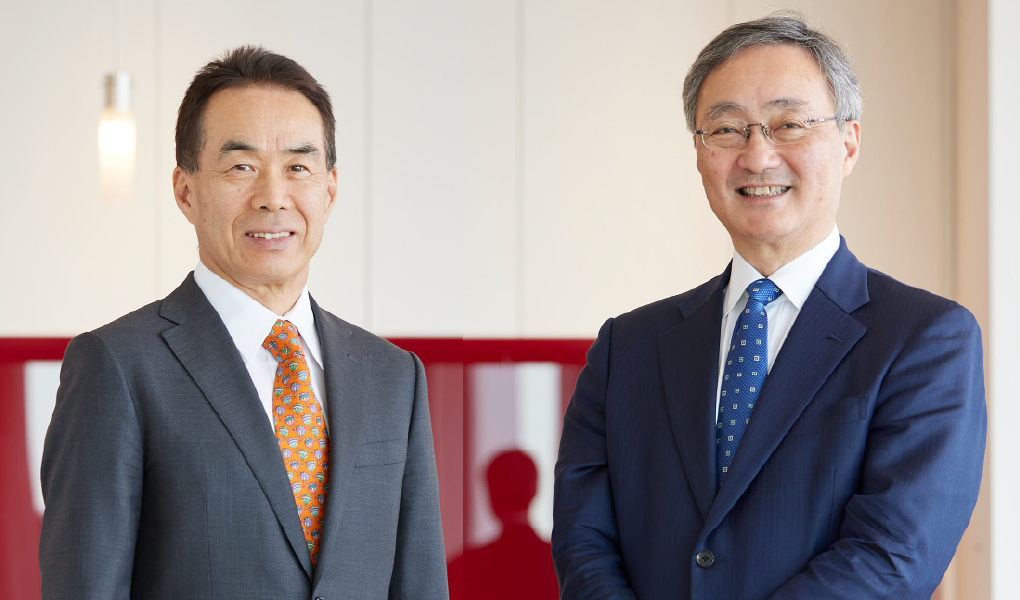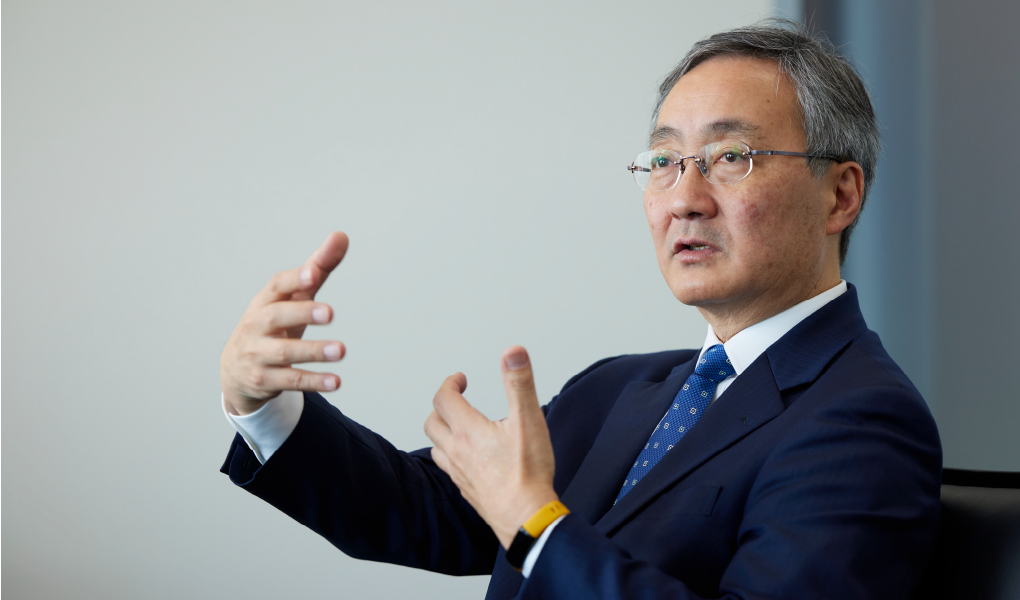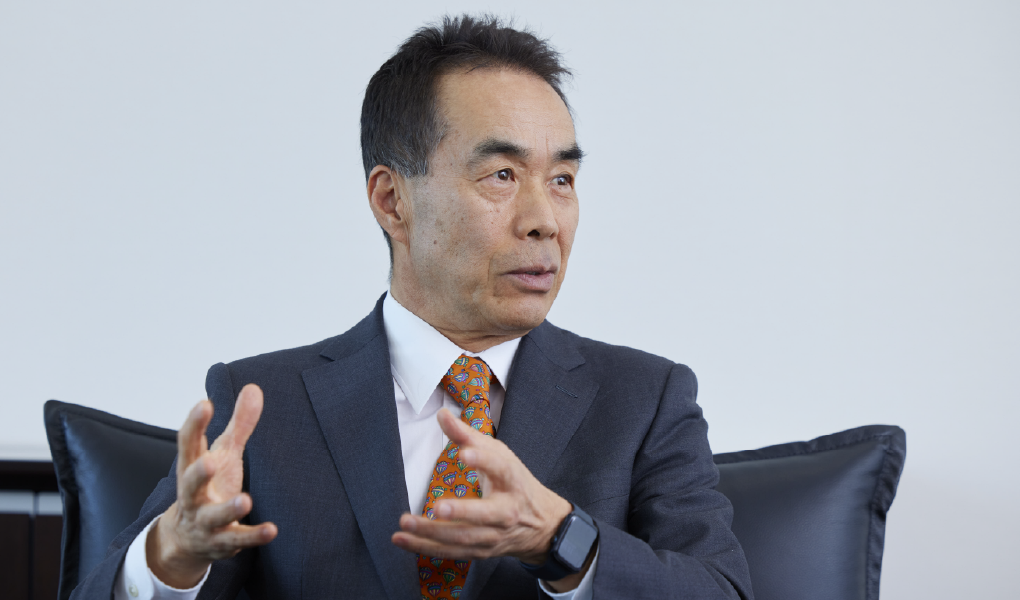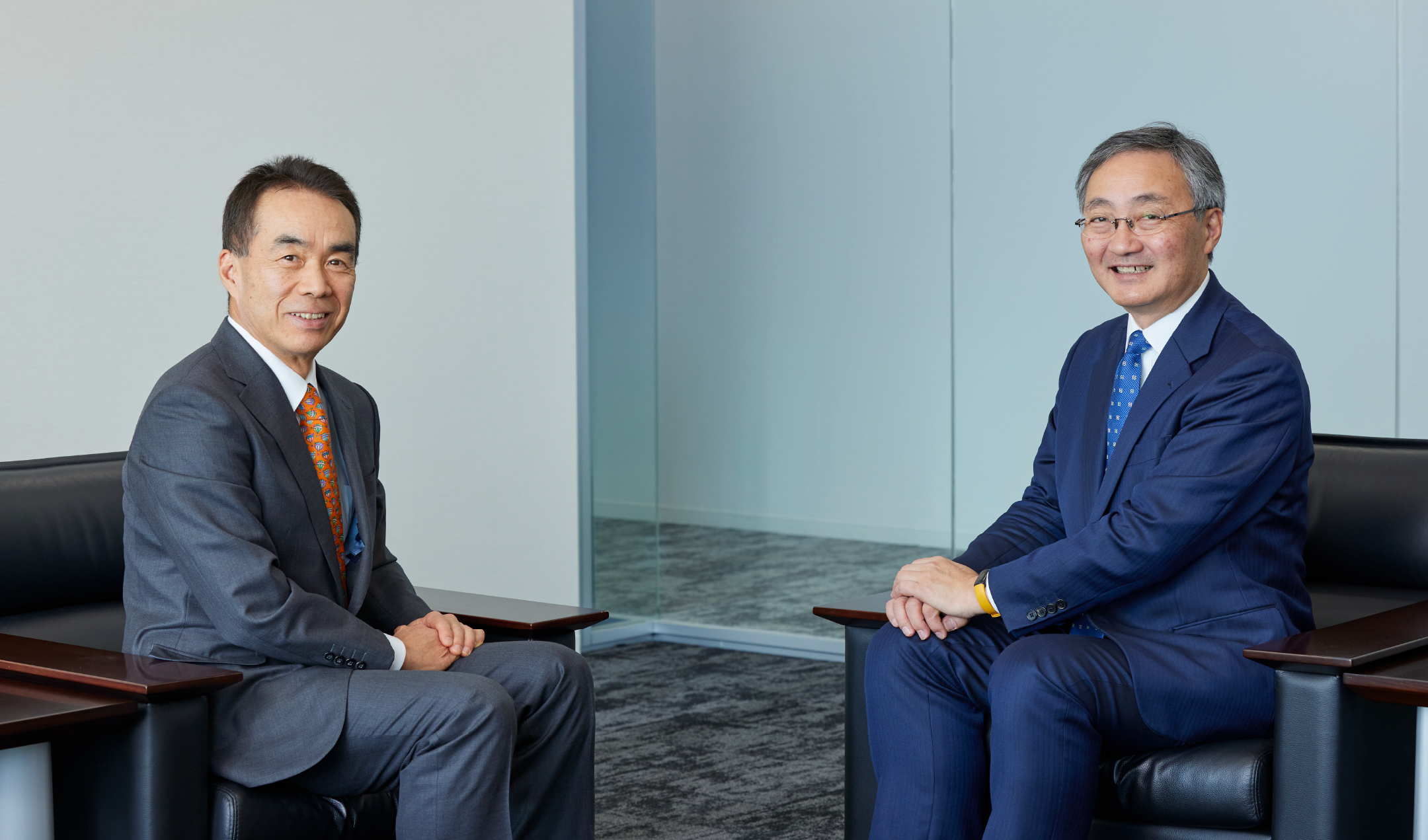Integrated Report 2024 Dialogue: Giri Goitsu (inseparability of morality and economic activities) and People-oriented Management
Published on June 28, 2024
This page has been translated using AI.
We invited Ken Shibusawa to talk with our president Satoru Takashima. Mr. Shibusawa is the chairperson of Commons Asset Investment Inc. and an expert in long-term investing who is also familiar with sustainability management.

He established Shibusawa and Company, Inc. in 2021 after gaining experience at multiple foreign financial institutions and hedge funds. He founded Commons Inc. (currently known as Commons Asset Management Inc.) in 2007. He become the chair of the company in 2008. Chief Executive Officer of Shibusawa and Company, Inc. He is a great-great-grandchild of Mr. Eiichi Shibusawa.
The manager’s role in living up to the Giri Goitsu concept
TakashimaIn January 2024, we started our first year as the artience Group. The two-year project to change the name of the company began during the third year since I became the president. The name change does not indicate an end. It is the start of something that is really important. We are in a stage of transforming our business and increasing our corporate value.
There are many things to learn from Eiichi Shibusawa’s book Rongo to Soroban (The Analects and the Abacus.) I have read it many times. I intend to commit to Giri Goitsu where we contribute to the interests of both corporations and society, as Eiichi Shibusawa has advocated.
ShibusawaTo tell you the truth, I have not thought about Eiichi Shibusawa, my great-great-grandfather, for a long time. When I founded a company at the age of 40, I paid attention to the book he wrote. He was involved in the establishment of 500 companies. Until that time, I thought that he was uninterested in leaving a fortune to his descendants, but I realized that he left us a great asset, his words. Those words have often given me useful insights when running my investment company.
You started to transform your company by giving up the name of your long-standing company. That shows your strong determination. I believe that there have been struggles for you as a president.
TakashimaI had a sense of crisis even before, because of our weak earnings. However, the impact of the COVID-19 pandemic had a strong trigger for the final push for my determination for the reform. In the April of the year I became president, the Japanese government declared a state of emergency. I told our office staff to work from home, but I continued to ask our factory staff to work at the factory to avoid a halt in production. At that time, I really struggled wonderTakashima In the course of transforming almost everything about the corporation, we will never change our Corporate Philosophy of People-oriented Management. In Japan, people tend to prioritize the whole over the individual. When speaking, we tend to use sentences having the organization as the subject. Fundamentally, however, the organization does not exist without the individuals. When you get right down to it, a company or a division comes down to a specific individual. I think this is important. Shibusawa You are absolutely right. There are lots of attractive Japanese individuals but they are often buried in an organization. It is quite a waste. People-orientedness is increasing the visibility of the value of these individuals. There are few manufacturers that have stressed the importance of individuals from the beginning. I feel this is novel. Takashima This statement of the importance of indiing if there was really a cause to justify this difference. I asked myself if we were able to provide something to society that we needed to continue to produce, even if that meant exposing the staff to infection risk. When the Great East Japan Earthquake occurred, our mission was to prevent the stoppage of the supply of inks for newspapers which communicate information.
Today, in the era of digitalization, the situation is different. At that time, I realized that we had to change our business to produce things that are truly needed by society.
ShibusawaAs you experienced, business managers often experience agony when there are conflicting requirements. One example is that customers want prices to be lower, employees want wages to increase and investors want profit.
It is interesting that Eiichi Shibusawa’s book is entitled The Analects and the Abacus, not The Analects or the Abacus. “Or” suggests selection. It increases efficiency and a selection is made from existing options. “And” means the coordination of multiple factors that may conflict with one another.
Takashima Indeed, the importance of this “and” is observed in various situations. In business administration, there are many cases where we pick one option and give up another, but sometimes we must make both coexist in harmony by whatever means available.
ShibusawaIn an organization, decision-making is left to a higher and higher level people when it is difficult to choose one option and abandon others. The final decision maker is the president. They must make a decision weighing the unforeseen future and the present, by looking into both. The role of managers lies in choosing “and,” rather than “or.” New value and innovation are created there.
Respecting the value of individuals based on People-oriented management
TakashimaIn the course of transforming almost everything about the corporation, we will never change our Corporate Philosophy of People-oriented Management. In Japan, people tend to prioritize the whole over the individual. When speaking, we tend to use sentences having the organization as the subject. Fundamentally, however, the organization does not exist without the individuals. When you get right down to it, a company or a division comes down to a specific individual. I think this is important.
ShibusawaYou are absolutely right. There are lots of attractive Japanese individuals but they are often buried in an organization. It is quite a waste. People-orientedness is increasing the visibility of the value of these individuals. There are few manufacturers that have stressed the importance of individuals from the beginning. I feel this is novel.
TakashimaThis statement of the importance of individuals is a new thing for us. Since we are a manufacturer, we as an organization have long operated on a model of thinking about the stable production of high quality goods at low cost. It is indeed important, but today the environment is changing so drastically that the structure of society will probably be totally different in ten years due to the increased use of AI and other factors. In this situation, I believe that the value based on the senses of individuals will be more important̶in addition to the scientific and logical value that we haveemphasized. In a chaotic era, we will actively create new businesses based on free thinking, for example, combining one thing with another to make some other thing possible. We will thus develop a strategy model that capitalizes on value that resonates with the senses that is provided by individuals. This concept is reflected in our Brand Promise, “Creating value that resonates with the senses and building a future where all people can live enriched lives,” and also in our new company name coined by combining art and science.

Increasing human capital to create new value
ShibusawaIn the past, it was said that the goal of businesses was to maximize profit. Today, it is not possible for businesses to win the support of society if they ignore the various environmental and social issues and only seek profit. We should strive to maximize value. This includes both financial and non-financial value. And in many cases, the genuine value of the company is obscure. Only the tip of the iceberg is visible. I suppose it will take time for the remainder to be visible. In particular, the value relating to people is among the most invisible. But this is exactly what is absolutely necessary from the perspective of new value creation.
TakashimaYes, I agree. The most significant key to the people-oriented management we seek to implement is how we improve the value of humans or human capital. This is largely dependent on motivation. We need to create an environment that maximizes the performance of individuals.
ShibusawaMore and more companies say that personnel are their greatest asset. However, unlike factories and land, which can be owned and recorded as assets in companies’ balance sheets, personnel are different from tangible assets as they cannot be owned by companies. Even so, they are without doubt something that needs to be included for value generation. Corporate value can only be created by a combination of financial and human capital.
TakashimaNowadays, we also see an increase in the percentage of human capital that are from overseas in the Group. The overseas market is now a growth driver. After years of operating businesses, we have more bases around the world and our networks are increasingly broad. Regarding this, the biggest issue is people. We need to improve the functionality of our human resources in accordance with our global strategy. We wish to be able to appoint local staff to manage overseas bases as soon as possible and increase personnel exchanges beyond the borders between nations. Globalization is necessary for the management of corporations. For example, non-Japanese nationals should be hired as officers to increase the diversity of the Board of Directors.
ShibusawaI feel that companies find it difficult to quantify human capital when it is easy to quantify financial capital. At the same time, investors, who evaluate companies, are not ho-mogeneous. Some investors have a short-term perspective and ask that an ROE be achieved. Others see businesses from a longterm viewpoint and appreciate the corporate stance of respecting individuals while achieving some financial results.

Governance with an emphasis on Freedom and Discipline
ShibusawaHow information is shared with investors is another important matter. These days, corporate PBR figures below 1 are being talked about a lot. This suggests that the market is concerned about companies losing net assets (book value), in the future. In other words, they are worried about companies’ financial value. It is often the case that the reasons underlying this concern is that information about non-financial value is not sufficiently communicated. Long-term investors pay attention to how companies perceive their issues and plan actions to overcome them, rather than to current achievements. Information must be disclosed strategically. The art of storytelling̶properly presenting the non-financial value that decides the future as well as financial value̶is important.
TakashimaOf course, we must firmly address the PBR issue. It is necessary not only to increase financial value but also to visualize non-financial value, including human capital.
Governance is another very significant element of the non-financial aspects of business. We have stressed the slogan Freedom and Discipline inside the Group. Regarding discipline, we are clearly committed not only to compliance but also to results. This means that to achieve our targets we have to clarify who is responsible them. We will also build an environment that enables employees to take on challenges more freely and revise our personnel system to ensure this.
Shibusawa I feel this is related to the essence of governance. Freedom and discipline are two sides of a coin. It will be vital to allow the staff to act freely as long as they do so responsibly. Governance that restricts employees so that they can only do things that have been stipulated in the rules does not create value.
TakashimaAt present, a majority of our Board of Directors are outside directors. They share a culture of positively allowing personnel to take risks and try new things. They do not unilaterally say that something will fail or that it should not be done. I feel very grateful to them when they say that the role of outside directors is to watch and appreciate employees’ taking on challenges.
ShibusawaBrilliant. Originally, the word risk refers to the high level of uncertainty about whether something will end in success or failure. In this situation, risk management is the steering of actions in a better direction. It is totally different from doing nothing at all because of a fear of poor results.
Expanding diverse networks and trying to step into unknown areas
TakashimaThe new medium-term management plan, artience 2027, was started in FY2024. It embodies our determination to transform. It clearly defines the business domains that we focus on. We will allocate our management resources intensively to these domains by taking risks to live up to stakeholders’ expectations.
ShibusawaIn this talk with you, I have come to understand that your determination is strong. Your company started with the manufacturing of printing inks and later diversified its businesses according to changes of the times. You have organically evolved. I hope you will keep in mind the importance of putting dots of business in different areas in your ongoing process of selection and concentration.
Even if they do not directly impact the figures for the current fiscal year, the dots will connect to form some kind of shape in 10, 20 or 30 years and possibly bring about new changes.
TakashimaI will take this as a significant suggestion. In many cases, we cannot step into unknown areas alone. We will extend new networks and explore the possibility of collaborating with different companies and organizations.
Thank you very much for joining me today

Management Plan artience2027/2030 "GROWTH"
